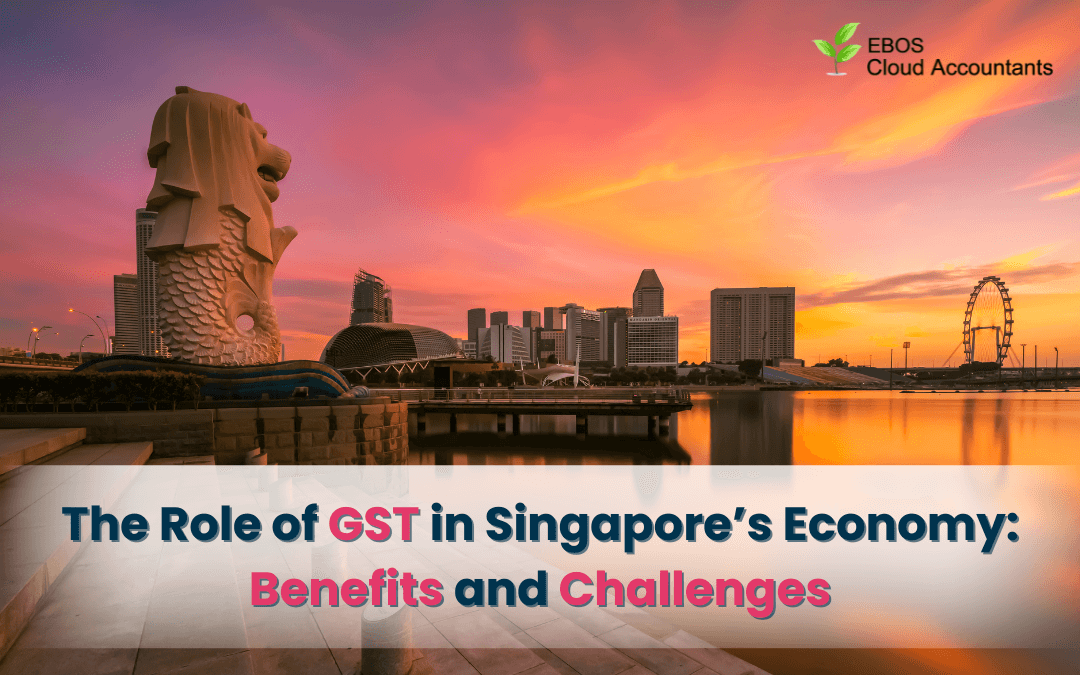Introduced on April 1, 1994, the Goods and Services Tax (GST) in Singapore is a value-added tax imposed on the provision of goods and services. It is essential to the nation’s fiscal policy since it influences consumer behavior and corporate operations and gives the government a consistent source of income. The advantages and difficulties of GST in Singapore’s economy are examined in this article.
Benefits of GST in Singapore
- Revenue Generation
The Singaporean government receives a substantial portion of its funding from the Goods and Services Tax (GST), which goes toward funding social services, infrastructure, healthcare, and education. Maintaining Singapore’s strong public services and high level of living depends on this source of income. - Broad-Based Tax System
GST is a broad-based consumption tax, which means it covers a variety of products and services. This wide base makes sure that everyone pays into the system, which lessens the tax load on any one group and creates a more reliable source of income than income tax. - Encourages Savings and Investments
In contrast to income tax, which takes away from people’s disposable income, goods and services tax (GST) taxes consumption. People may decide to save or invest a portion of their income rather than using it altogether for taxable goods and services, which might stimulate savings and investments. - Efficient Tax Collection
Managing and collecting GST is rather simple, especially with the aid of digitalization and contemporary technologies. Companies take on the role of tax collectors, sending the government the GST they have received from customers. The government’s administrative load is lessened by this efficiency. - Promotes Fairness
Because it taxes consumption rather than income, the GST is regarded as a fair tax system. This implies that rather than paying taxes based on their income, people contribute to the tax system based on their spending. In order to match tax contributions with levels of consumption, higher spenders pay a higher GST.
Challenges of GST in Singapore
- Regressivity
The regressive character of the GST is one of its primary critiques. Lower-income households may be disproportionately affected because they often spend a larger proportion of their income on consumption. Lower-income families in Singapore receive GST vouchers and other forms of financial help from the government in an effort to lessen this. - Inflationary Pressure
Thanks to its ability to raise prices for goods and services, GST may exacerbate inflationary pressures. Businesses may pass on increased costs to customers in the form of higher pricing and possibly diminished purchasing power when GST rates are raised. - Impact on Small Businesses
The administrative burden of maintaining thorough records and submitting frequent returns is one of the difficulties small businesses may have while trying to comply with GST laws. This can be especially burdensome for companies with little funding and tax-related experience. - Cross-Border Competition
Different tax regimes can have an impact on local enterprises’ competitiveness in an increasingly globalized market. For example, businesses in Singapore may find it more difficult to compete if their neighbors have lower or no GST, particularly in price-sensitive areas. - Compliance and Enforcement
Strong enforcement procedures are necessary to guarantee adherence to GST requirements. In order to stop tax evasion and guarantee proper GST collection, the Inland Revenue Authority of Singapore (IRAS) needs to make investments in company monitoring and audits. This might demand a lot of resources and calls for ongoing development of enforcement tactics.
Conclusion
Because it offers a steady source of income, encourages investment and savings, and supports a wide-ranging tax system, the GST is essential to Singapore’s economy. But there are drawbacks as well, such its regressive effect, possible inflationary pressures, and the administrative load it places on small enterprises. The Singaporean government invests in effective tax collection and enforcement methods, regularly adjusts its policies, and offers targeted assistance to lower-income households in an effort to maximize advantages and minimize problems.
All things considered, the GST continues to be a pillar of Singapore’s fiscal policy, striking a balance between the necessity of raising revenue and the requirement to preserve an equitable and competitive business environment.
Check out our website at https://ebos-sg.com/ to explore more articles and discover how our Cloud Accountant Services can support you on your business.







